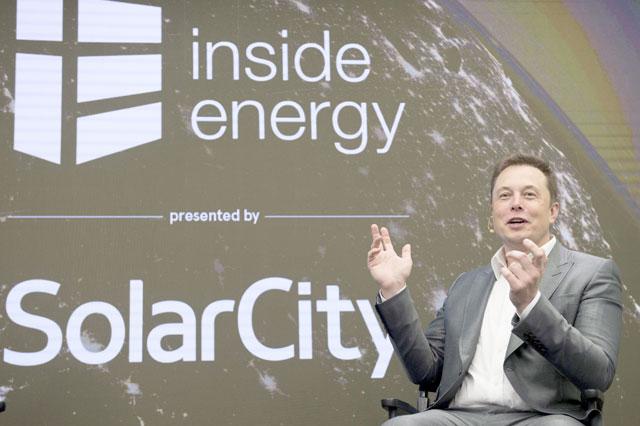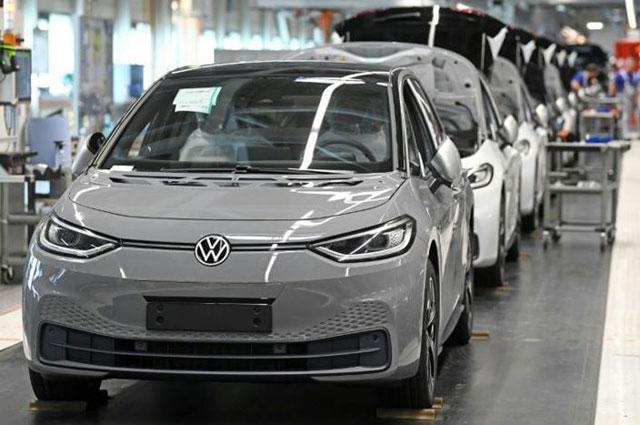You are here
Tesla faces German battle over battery-powered homes
By Reuters - Nov 28,2015 - Last updated at Nov 28,2015
FRANKFURT— If Elon Musk’s vision of millions of households producing all their own power becomes a reality, it will probably happen first in Germany. But he will face a battle for market share against local firms with years of experience in renewable energy.
The South African-born entrepreneur’s company Tesla, best known for its electric cars, sparked global interest in the idea of self-powered homes in April, when it said it would start selling lithium-ion batteries for households next year.
The batteries, called Powerwalls, connect to solar panels on the roof of a house and aim to store enough power during the day to drive kettles and washing machines at night, raising the prospect that households one day will be able to rely fully on clean energy and become independent of the power grid.
There are big challenges.
The technology does not yet allow most users to disconnect from the grid — the German solar industry association BSW estimates batteries currently raise solar power self-sufficiency to at least 60 per cent.
Then there is the price. Buying and installing solar panels and batteries costs around 10,000 euros ($10,600) or more.
But the technology is improving, and costs falling, and some analysts think Germany — with more solar panels than anywhere in the world and sky-high power prices — could become the industry’s first mass-market.
“The business model of power batteries is becoming increasingly attractive,” said Norbert Schwieters, global utilities leader at consultants PwC, noting market estimates that sales in Germany could reach half a million within a decade, up from around 25,000 now.
‘Lifestyle gadget’
If the market does take off, Musk will have a fight on his hands against German companies with established retail networks and years of experience managing solar equipment.
While acknowledging Musk’s slick marketing — Powerwalls are made at his “Gigafactory” in the Nevada Desert — some of these rivals think he has created a buzz around home power storage batteries that will ultimately work in their favour.
“Tesla has made sure that they’re seen as a lifestyle gadget,” said Volker Wachenfeld, in charge of hybrid energy and storage solutions at SMA Solar.
SMA Solar is one of a number of German companies with ambitions in the market, including Sonnenbatterie, SENEC.IES and Varta. Daimler Accumotive is also due to launch a product, while Solarwatt, owned by major BMW shareholder Stefan Quandt, says it is ready to join the fray.
Sonnenbatterie, whose backers include Germany’s E-Capital and Czech firm Inven Capital, has already sold around 8,500 batteries in Europe, mostly in Germany, but its ambitions go further.
“The biggest challenge of our generation is the move to renewable and inexpensive energy supply,” said its 32-year-old managing director, Philipp Schroeder. “I started this vision and now want to take it to global success.”
Schroeder knows Tesla well — he worked there until earlier this year, leading its German and Austrian operations with a brief to roll out a network of charging points for Tesla cars in Germany. He jumped ship for his old employer Sonnenbatterie just as Tesla was gearing up for its European home-battery push.
Tesla, which has made Germany one of its three launch markets for Powerwalls, is ready for a fight, however. It has struck partnerships with German companies Beegy and LichtBlick in order to benefit from local expertise.
“Tesla is working with leading German and international solar PV [photovoltaic] distributors and installers to offer complete solar PV solutions including PV panels, a solar PV inverter, and installation,” it said.
Is the price right?
With the second-highest retail power costs in Europe, partly the result of the government’s break-neck push into renewables, Germany’s economy stands to gain massively if it can take a chunk of its back-up grid capacity offline.
Germany boasts about 39 gigawatts (GW) of installed solar capacity, bringing its total capacity to nearly 200 GW, more than twice the level it theoretically needs.
Vast amounts of costly back-up power are required to kick in when the sun doesn’t shine. If homes, offices and factories can store their solar power, many of the country’s power stations can be scrapped and transmission systems do not have to be extended at billions of euros of cost.
Incentives for solar power producers to feed surplus supplies into the national grid are set to end in 2021, providing a reason for them to store more power themselves.
“First it was technology aficionados, today it is a broad number of home owners,” Herbert Schein, CEO of Varta Microbattery, said of the growing interest in power batteries.
Schein estimates sales at Varta’s energy storage unit have doubled this year. “In the future we will add small companies and farmers,” he said.
Battery systems of various suppliers may differ, but costs overall have fallen and lithium-ion battery packs are the norm, having pushed aside lead batteries.
With a slim, curved appearance and made to be wall-mounted, Tesla’s Powerwall is designed to appeal to style-conscious consumers who agree with co-founder and CEO Musk’s statement that traditional batteries “suck”.
The batteries offered by most German providers can be placed in basements, common in German homes and take up no more space than a small refrigerator. Smaller batteries can be wall-mounted too.
The batteries start selling at about 1,000 euros per kilowatt peak (kWp) — the level at which experts say the technology makes economic sense for buyers — with an average four-person household usually needing a 5 kWp system.
Tesla says the 7 kWp Powerwall will cost 3,615 euros wholesale, including value added tax.
Sonnenbatterie this week announced a 3,599 euro small battery and offers a full home solar power and storage system at 9,000-13,000 euros.
Related Articles
SAN FRANCISCO — Electric car maker Tesla Motors wants to buy solar panel maker SolarCity for up to $2.8 billion in an attempt to create a on
FRANKFURT — When Volkswagen chief executive Herbert Diess joined Twitter in January, he used his first tweet to warn pioneering electric car maker Elon Musk that he was coming after him.
PARIS — Startups and major carmakers are starting to incorporate solar panels on their electric vehicles, an addition that extends the range


















